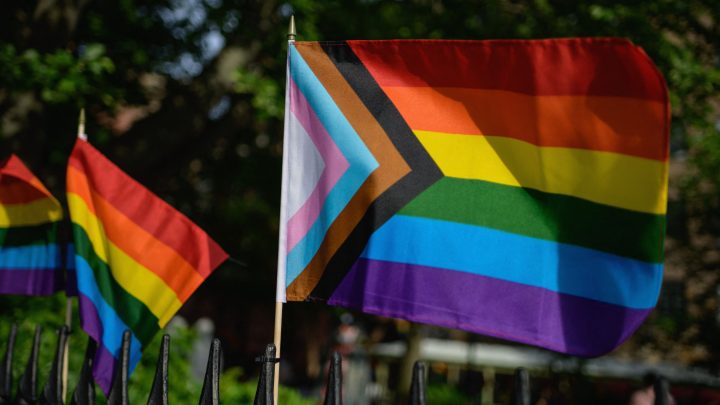
LGBT support makes good economic sense

Pride month is coming to a close. While many celebrated throughout the month, Pride comes at a difficult time for LGBTQ rights.
So far, there’s been a record number of anti-LGBTQ bills introduced in state legislatures; over 500 hundred, to be exact. In another blow to LGBTQ rights, there’s been a record 70 anti-LGBTQ laws enacted this year alone.
Evidence shows that less inclusion can harm economies. Lee Badgett is a professor of economics at the University of Massachusetts Amherst and author of the book “The Economic Case for LGBT Equality: Why Fair and Equal Treatment Benefits Us All.” She focuses on the relationship between LGBT inclusion and economics. In a 2019 report, she and her colleagues found that more inclusion for lesbian, gay and bisexual folks can result in higher GDP.
“So in the context of countries overall, we found that having an extra law, being a little bit more legally inclusive was worth roughly $2,000 in GDP per capita,” Badgett told Marketplace’s Sabri Ben-Achour.
The following is an edited transcript of their conversation.
Sabri Ben-Achour: What led you to focus on the economics of LGBT inclusivity, out of curiosity?
Lee Badgett: I got involved in looking at this in the marriage equality debate here in the U.S. People made lots of claims about how expensive marriage would be for state governments, the federal government, that sort of thing and once I dug into it, I realized that it was just the opposite. And thinking about what good things would happen if we were more inclusive of same sex couples and really more broadly of LGBT people was what led me to this book.
Ben-Achour: At a macro level, you found that more inclusive policies for lesbian, gay, bisexual folks actually corresponds with higher GDP. Let me first ask, how strong is this connection?
Badgett: It’s strong, we see the correlation, even after we control for all the other kinds of things that affect how well the economies do. So things like how much trade they have, what their level of education is for their entire population, how big the labor force is, their capital stock, and even taking into account how much gender equality there is, we still see that relationship, very clear relationship between LGBT inclusion and the GDP. So in the context of countries overall, we found that having an extra law, being a little bit more legally inclusive was worth roughly $2,000 in GDP per capita.
Ben-Achour: Wow. I think people may hear that and think, ‘Well, oh, it’s just because rich countries are more likely to be more inclusive and that’s all that is.” Is that the case or is there you know, a mechanism at work here?
Badgett: I think that’s partly the case. But there’s clearly something else going on underneath it. And I think it’s easiest to see if you look at it from the perspective of LGBT people themselves. So we know that when young LGBT people go to school, the most common thing they experienced is bullying, whether it’s by their fellow classmates, sometimes even their teachers, they may be harassed or discriminated against in other ways. And we know from research that that leads to lower GPAs, people are more likely to drop out or be absent from school, they’re not as likely to go on to get university education. So it’s holding back their ability to develop human capital. That’s, you know, the skills, the knowledge, the creativity, that economies is relying on to grow. And then they also have health impacts whether for young people and for older LGBT people, stigma literally can make people sick. We see higher rates of different health disparities for mental and physical health. And then in the workplace, that kind of harassment and discrimination that’s very common in every country that’s ever been studied shows that that’s a potential drain on productivity as well. So I think, you know, thinking about how much those might look if we could put monetary values on them, and I’ve tried to do that and some other people have done that, it still adds up to a big hit to GDP of about 1% or more in some countries.
Ben-Achour: It’s interesting to look at that at the macro level, because at the more micro level, we have seen some examples where, for example, North Carolina had a bathroom bill, it was costly to that state. On the other hand, Bud Light tried to be more inclusive and it cost them quite a bit of business. How does this translate to sort of the micro level?
Badgett: Yeah, well, for North Carolina, it translated to billions of dollars in lost business opportunities, people moved … companies moved facilities, they decided not to go there. There were many, many ripple effects there. I think, you know, the Bud Light example is a really interesting one because it shows you know, how not to actually be inclusive of LGBT people. I think they weren’t quite ready for what happened and they hadn’t thought through their marketing strategy very well, I think. And businesses are, I think most of them are sticking with their with their policies of inclusion, because they’ve worked for them. We know from research, it’s led to higher profits, higher stock prices, higher productivity, when companies are more inclusive. So I don’t think they’re going to be going backwards either, especially if they look ahead to the millennials and the Gen Z, folks who are their future customers and workers and current workers, you know, those folks are very supportive of LGBT inclusion, and many more of them identify as LGBT, then, you know, in earlier generations, I think there’s really … this is probably just a little blip given the, you know, the current hot button politics around certain state bills that has led to the attention to Budweiser.
Ben-Achour: So if we are to look at this from an economic perspective, what might we do to sort of improve not just quality of life for LGBT people, but to help our economy?
Badgett: Well, I think there are a couple of things. The big one is to make sure that laws and policies are aligned with inclusion. You know, in the United States, we’ve come a pretty good ways. But clearly, there is still a debate going on about how inclusive to be with regard to transgender people in schools, for example, but also, you know, people are talking about rethinking marriage equality. There’s some Supreme Court justices who’d like to do that. So it’s still a live issue here. And it’s a really huge issue in lots of other countries, especially amongst developing countries, about how inclusive to be and their laws are not always lined up in terms of criminalization of homosexuality, non-discrimination, kind of the core pieces that need to be in place to unlock this sort of inclusion dividend, I guess you could call it. These are still live issues and so lining those up is key. I think tracking better how well we’re doing is essential. I sound like any economist, but we definitely need better data. Because we can’t see how well we’re doing. Are we fully employing the the LGBT human capital and workforce that’s there to to make an economy stronger? We just we don’t have … we have better data here in the U.S. than we used to have. But still, our core economic surveys are not including these sorts of measures. So I think those are the first two overall big steps that things that need to be in place.
Ben-Achour: Yeah, it is complicated, because the definition of inclusion is is moving. It’s changing and in great dispute at the moment, it seems. So it’s sort of even the benchmark is tough to follow.
Badgett: Yes, that’s right. The benchmark, I think is moving and it does make it tougher. And, yeah, it’s interesting. If it’s tough here in the U.S., it’s going to be really tough in other parts of the world, too. But I think the general direction that we’re going is to, is to look at what we know about the lives of LGBT people, and to show where there are some big gaps economically, health wise, education wise, and to think about, you know, how to close those. And the nice thing is that that’s something that we should all be able to get behind. We all depend on everybody else for good health. We know that from the COVID epidemic, we depend on everybody else for good economic health, as well. So I think it’s a way to look at this issue that shows that we all have a lot at stake, it’s not just LGBT people. And so my hope is that that will, you know, help focus our discussions more directly on the things that matter.
There’s a lot happening in the world. Through it all, Marketplace is here for you.
You rely on Marketplace to break down the world’s events and tell you how it affects you in a fact-based, approachable way. We rely on your financial support to keep making that possible.
Your donation today powers the independent journalism that you rely on. For just $5/month, you can help sustain Marketplace so we can keep reporting on the things that matter to you.

















